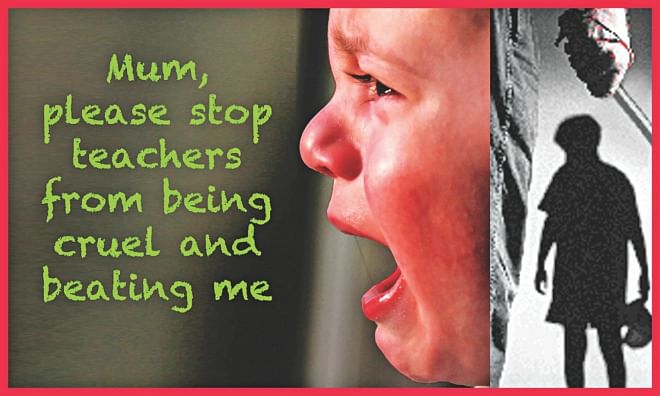Prohibiting corporal punishment in educational institutions

Corporal punishment in school refers to intentional application of physical pain as a method of changing behavior of students. Ordinarily people in favor of punishment in school opine that corporal punishment in classroom can be an efficacious technique of training and discipline. These children are better controlled, learn appropriate appreciation for authority, develop better social skill as well as improved moral character and learn to better social discipline. On the other hand, this type of torture causes pain, humiliation, low self-esteem, deep psychological trauma, distress to a student. It may also lead to multitude physical and social problems like school drop- outs, mood and anxiety disorders, alcohol and drug abuse, cardio- vascular disease, including irreparable mental damage. When teacher uses physical punishment, the child feels betrayed in the worst way possible. Regular physical punishment is responsible for lack of faith and may provoke rebellion.
Bangladesh's High Court in 2011 declared all types of corporal punishment in schools 'illegal and unconstitutional' after Bangladesh Legal Aid and Services Trust (BLAST) and Ain O Salish Kendra (ASK)'s litigation to stop cruel punishment for children. Ministry of Education also though banned corporal (inhuman) punishments in schools after upsurge different incidents of torture viz., canning and beating to pupils, the case of degrading treatment against students are recurring at different educational institutions across the country.
In 2013, more than 150 students were beaten by an assistant teacher of Gulta Government Primary School in Tarash upazilla of Sirajgonj district. It has also been reported that thirty students were unable to attend their class due to their injury received from the teacher's beating. In June 2013, a child was tortured by teachers at a madrasa at Jamalpur and hand of child was broken by teacher at Joypurhat. The other common forms of punishment in schools are scolding, hitting on palm with ruler or stick, standing in classroom, hitting on other body parts, slapping, ear, hair or skin twisting and kneeling.
Relevant international and national laws provide safeguard for children against inhuman and corporal punishments. Physical and humiliating punishments constitute violence against children and represent gross violation of human rights. The Universal Declaration of Human Right in article 5, International Covenant on Civil and Political Rights in article 7 and United Nations Convention against Torture urge that no one shall be subjected to torture or to cruel, inhuman or degrading treatment or punishment.
Bangladesh as a state party of UN Convention on Children's Rights obliges to protect children from being subjected to torture, punishment and any cruel or inhuman or humiliating behavior (article 37) and physical violence (article 19) as children are human beings with the right to dignity and physical integrity. The provisions suggest that school discipline system requires being consistent with the child's human dignity and in conformity with the present convention (Article 28.2).
Moreover, article 35(5) of Bangladesh's constitution states, 'No person shall be subjected to torture or to cruel and inhuman treatment or punishment'. There remains no precise prohibition in state legislations of corporal punishment in educational intuitions. The Children Act 2013 does not have any particular provision prohibiting corporal punishment in schools or madrasas. Section 70 of the Act prohibited hit, abuse, torture or negligence to children for preventing physical harm. If any person commits the 'offence', s/he will be awarded up to five years imprisonment or Taka 1 lakh fine or both, according to the provision. The Education Ministry in 2010 issued a circular prohibiting all sorts of corporal punishment on students. In 2011 the ministry issued another circular saying that it has formulated a policy to end corporal punishment.
Children learn best in an environment where they feel free and supported, whereas corporal punishment has been evident to generate feelings of humiliation, anxiety, and worthlessness. Simultaneously while school is intended to develop the child productive member of society, degrading treatment has been shown to increase a child's vulnerability to depression and to inhibit the development of independent and creative thought. Thus, in compliance with international and national obligation Bangladesh is obliged to prohibit inhuman punishment in schools in line with realisation of child rights, survival and best interest.
Supervision of the Ministry of Education to inspect the schools and to take immediate and proportional disciplinary action against teachers who have been shown to abuse a child is highly expected in this concern. Teachers must receive training on non-violent and effective means to manage a classroom and inspire students in order to stop incidents from occurring. Alternatives for violent punishment are verbal warning, constructive work such as tidying up the classroom; establishment of and strict adherence to class rules by the students in a participatory way; building a relation of trust between teachers & students so that learners feel respected and understood, and can recognise their own identity.
To end the violence stunting the potential of the next generation, we must all take a proactive role in protecting children from abuse, building their sense of self-worth, and teaching them peaceful and constructive role to build society. Practically, putting an end on traditional punishment in the schools has need for a move in how society values the dignity of children and respects their right to be free from violence. Families, educators and the society as a whole need to be made aware of laws and practices concerning children's rights. Then, society will turn away from physical and mental punishment and teach them discipline with love and mutual respect.
The writer is Lecturer of Law, Jagannath University.

 For all latest news, follow The Daily Star's Google News channel.
For all latest news, follow The Daily Star's Google News channel. 



Comments